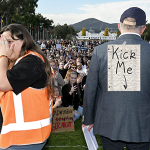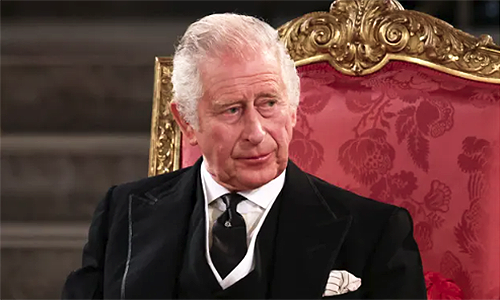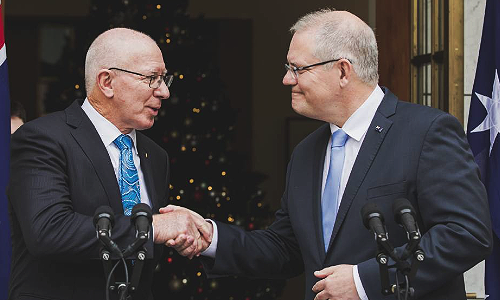
by AUGUSTO ZIMMERMAN – ON SATURDAY, King Charles III was solemnly crowned in Westminster Abbey in a ceremony whose roots date to the coronation of King Edgar the Peaceful in 973.
The central act of this is when the king accepts his calling from God and receives the grace and powers to fulfil his responsibilities according to the law.
- Some may think of this dismissively, but symbols can open the mind and heart to the transcendent.
- Christianity needs to be vigorously articulated, or else lethal values and ideologies will flourish.
- Royal power is limited by the law, which makes the monarch accountable to God.
The most important book in the development of Western Civilisation is the Bible.
One of its most significative passages for the study of government is found in 1 Samuel 8:4-6, a passage where the prophet Samuel warns the people of Israel what lies in store for them if they have their wish granted that a king should rule over them.
WARNED
The Israelites had asked Samuel to “appoint for us, then, a king to govern us, like other nations”. He was unhappy and warned them to be careful of their wishes.
In fact, the kings of Israel would be so rapacious that eventually, the people would cry out to God to save them from the kings (1 Sam. 8:18).
Be that as it may, medieval England was shaped by a form of Christianity that placed the monarch strictly under the law. Written in the 13th century, the same century as the Magna Carta, Sir Henry de Bracton’s De Legibus et Consuetudinibus Angliae was the first ever systematic treatment of the common law.
A central point in this celebrated book is to declare that: “The king ought not to be under man but under God and under the law because the law makes the king.”
Bracton’s theory implied that the king was submitted to the law just as Christ had submitted to the law: “For there is no king where will, and not law, wields dominion.
“That as a vicar of God, he ought to be under the law is clearly shown by the example of Jesus Christ. He used not the force of his power but the counsel of His justice.
“Thus, He was willing to be under the Law, ‘that He might redeem those who were under the Law’. For He was unwilling to use power, but judgment.”
As noted by the late Sir Owen Hood Phillips, who was a professor of jurisprudence at the University of Birmingham: “The same view is also expressed in the Year of the Books of the 14th and 15th centuries. Such superior law governed kings as well as subjects and set limits to the prerogative.”
Chancellor to Henry VI, Sir John Fortescue (1394–1476), endorsed the same principle which grew out from Magna Carta and that was further elucidated by Bracton, namely that “the king is under God and the law”.
LIMITED
This was the royal power being limited by the law, which makes the monarch accountable to God.
“For law,” Fortescue declared, “is necessarily adjudged cruel if it increases servitude and diminishes freedom, for which human nature always craves.
“For servitude was introduced by men for vicious purposes. But freedom was instilled into human nature by God. Hence freedom taken away from men always desires to return, as is always the case when natural liberty is denied. So he who does not favour liberty is to be deemed impious and cruel.”
Fortescue was one of the earliest lawyers in the age of the Renaissance to develop a coherent body of doctrine that explained the noblest area of the common law: the law of the constitution.
In Fortescue’s opinion, the great merit of the English constitution lay in the fact that “the king of England is not able to change the laws of his kingdom at pleasure, for he rules his people with a government not only regal but also political”.
By asserting that the king can never change constitutional laws at pleasure, Fortescue felt confident enough to declare that England was a constitutional monarchy that had a superior, namely God.
Whatever one makes of these arguments, it is impossible to deny the relevance of Christianity in the development of English law.
Christian principles of jurisprudence largely contributed to the development of the common law, and they remain valid even today when interpreting and applying the law.
In this context, the ceremony held this Saturday at Westminster Abbey originates in a service first used in 973.
Although significantly modified since then, it retains the same basic structure, being in a Christian church, presided by a Christian minister, and based on the service of the Eucharist.
GOSPEL
At this ceremony, the king promises to “maintain the Laws of God and the true profession of the Gospel” and to uphold the cause of law, justice, and mercy.
He is presented with a copy of the Bible by the Moderator of the Church of Scotland, who says to him, “Here is Wisdom; this is Royal Law; these are the lively Oracles of God”.
The Archbishop of Canterbury says: “God crown you with a crown of glory and righteousness, that having a right faith and manifold fruit of good works, you may obtain the crown of an everlasting kingdom by the gift of him whose kingdom endureth forever.”
Following this is the Benediction, Enthroning and Homage, after which the ceremony returns to the Communion Service, with the king receiving the bread and wine and the archbishop pronouncing a blessing.
The ceremony then proceeds with the anointing of the king with oil in the words of Handel’s anthem, Zadok the Priest, which has been sung at every coronation since 1727.
SUBJECT
The king is then presented with the orb, with the words: “Remember that the whole world is subject to the Power and Empire of Christ our Redeemer.”
He is invested with the coronation ring, saying, “receive the ring of kingly dignity and the seal of catholic faith and may you continue steadfastly as the Defender of Christ’s Religion.”
He also receives the sceptre with the cross, the ensign of kingly power and justice. And he is given the rod of “equity and mercy”, marked by the dove, the symbol of the Holy Spirit.
As can be seen, the coronation ceremony is quintessentially a religious ceremony. At his enthronement, King Charles III solemnly vowed, at least symbolically, “to maintain the Laws of God and the true profession of the Gospel” and promised, “to the utmost of [his] power, maintain the Laws of God and the true profession of the Gospel”.
Whatever one may think of all this, nobody is able to deny that the coronation ceremony is entirely based on the principles of Christianity; for the King’s oaths compel him to maintain God’s law.
Some may think of this dismissively, but symbols can open the mind and heart to the transcendent. Moreover, they provide a powerful recognition that a version of Christianity needs to be vigorously articulated, or else lethal values and ideologies will be left free to flourish in a moral vacuum.PC













Commonwealth of Australia – Head of State
https://www.ourconstitution.org/aust_head_of_state.php